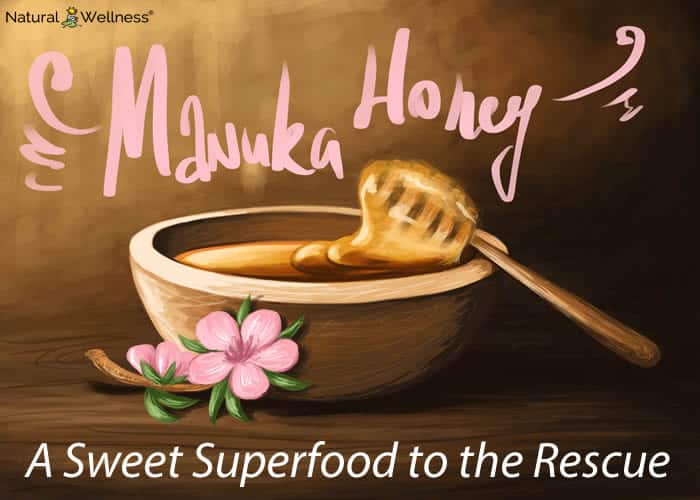

Manuka Honey
Manuka honey is produced from bees that pollinate the manuka flowers, or Leptospermum scoparium, of New Zealand and Australia. This flower is commonly called New Zealand Tea Tree as it has many of the same anti-inflammatory and antibacterial properties.
Honey has been used in healing since the times of Ancient Egypt (2600 – 2200 BC). Honey contains a compound previously known as “inhibine,” that we now identify as hydrogen peroxide, secreted by the hypopharyngeal glands of the bees. This hydrogen peroxide increases the healing processes of tissue, as well as provides protection against bacterial, viral and microbe infections.
Unique Manuka Factor (UMF)
Honey produced from the manuka flower contains a unique component called methylglyoxal (MG), which comes from the conversion of other compounds in the manuka flowers. MG is so effective as an antibiotic, antiviral and anti-inflammatory agent that honey producers have developed a system of rating it called the Unique Manuka Factor (UMF). To be considered effective for use in healing, the rating of a honey must be at a minimum of 10 UMF. The higher the UMF rating – the higher the concentration of antibiotic and anti-inflammatory properties.
Uses and Treatments for Manuka Honey
Manuka honey has been shown to be useful in treating:
- open wounds
- burns
- and other infections with topical use.
Honey can be spread on the wound or burn and then covered with clean gauze.
Manuka honey is also excellent for treating:
- acne
- dermatitis
- psoriasis, as it calms the redness and inflammation while preventing secondary infection.
Both the hydrogen peroxide from honey and the methylglyoxal (MG) act to provide protection from infection and improve healing.
This Superfood Keeps on Healing
- Manuka honey has been used to treat systemic and chronic condition of inflammation such as autoimmune diseases, gastrointestinal conditions like irritable bowel syndrome (IBS), and even gingivitis.
- Manuka honey has also been shown to boost your immune system and can be used in treating colds, allergies and other respiratory infections. A spoonful of manuka honey in green tea when you are sick is a delicious way to boost your immune system while increasing your fluid intake.
3 Cautions for Manuka Honey
- Most people have no trouble tolerating honey and, while it is safe to consume, it is very high in sugar.
- It should be noted that those allergic to bees may experience an allergic reaction to honey.
- Also, because of the high carbohydrate concentration, any honey may increase blood sugar levels.
In addition to its healing properties, manuka honey is sweet and delicious, and can be an excellent, health-boosting addition to your diet!




